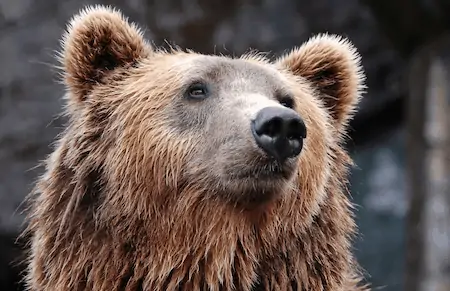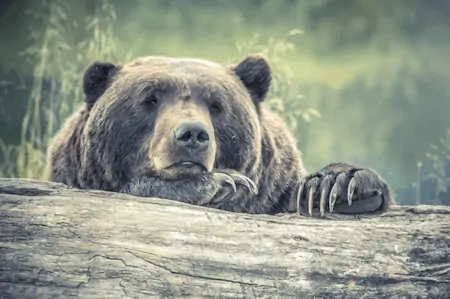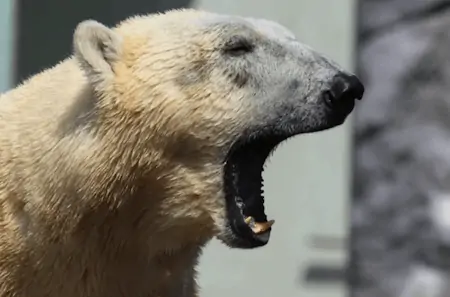Everyone has that one friend in their circle who is pretty much sensitive to smell. But is it even comparable to the sense of smell of a bear?
Hell no! Bear is known to be the most sensitive creature in the animal kingdom for having the best noses. That’s why they can easily track things from far distances without any distraction.
Now, here comes a question, how sensitive a bear’s sense of smell is? If you are also one of those people who are curious enough to know about this very thing, then you are in the right place.
In this article, we will be talking about the sense of smell of a bear with a comparison to other creatures who are also known for their smell sensitivity.
Smell Comparison Between Bear & Other Creatures

Dogs, Bloodhounds, Shark, Elephants, Kiwi, Snake, and Moth are the most sensitive creatures when it comes to smell sensitivity. But they don’t even come close to a bear when you compare other creatures with a bear.
To put it into perspective, compared to humans, an average dog can smell things 100 times better. That’s why you usually see trained dogs are being used by cops to detect evidence which is quite impossible by humans.
However, a bloodhound’s sense of smell is almost 300 times better than humans.
On the other hand, a bear’s smell sensitivity is almost 100 times higher than a bloodhound.
That means, compared to human beings, a bear’s smell sense is about 2100 to 3000 times better and that’s a mind-blowing fact to even think of.
What Makes Their Sense of Smell So Good?
Every creature has something unique in their default system and when it comes to bears, they are blessed with such a good sense of smell.
Bears are carnivore animals who keep foraging for food rather than hunting it. So, having a great sense of smell helps them to track the prey the right way from a very far distance.
Throughout history, bears have developed themselves as one of the best foragers on the animal planet. Because of their higher sense of smell, they don’t have to waste much of their energy in search of food.
They know where to go to find out the source of their food by using this great blessing.
Smelling Sense of Bears is Acute
There are multiple factors behind this acute smelling nature of bears. They have a great number of olfactory bulbs in their nose.
This small organ is usually located behind the eyes, right into the forehead area. The primary task of this organ is to interpret the smells that the nose is coming across.
You can say that a bear’s olfactory bulb works like a big olfactory balloon which is 5 times bigger than ours.
On top of that, the nasal mucosa of a bear is 100 times bigger than what we have. This is also notable that a bear’s nose size is bigger than humans or dogs which eventually means there is more space to collect smells.
Factors That Affect Bears’ Sense of Smell
There are certain factors that affect a bear’s smell sense to different intensity levels. Wind, Humidity, and temperature are those background factors that can affect the sensitivity of the smell of bears.
Humidity
Humidity is something that can attract the bear to smell you more intensely from a far distance. If you are hiking on a hot summer day with humidity in the atmosphere, you are more likely to sweat more than on other regular days.
And, this is something that attracts the nose of a bear so quickly, as they can smell sticky, sweaty odor so easily. Humid air means the air holds more water particles which help to transport the smell through an increasing number of vessels.
When the air doesn’t have enough humidity, even if you sweat and get stinky, the smell wouldn’t be traveling that easily like before.
So, if you are going to hike in a bear-prone area, make sure the time of the year doesn’t hold much humidity for better safety.
Wind
Our scent is basically a form of vaporized chemical that floats in the air. So, the smell keeps floating in the air, and depending on the direction of the wind, it can go in different directions.
Your scent must get into contact with the mucus membrane of a bear’s nose to allow it to be able to smell you.
We usually assume that bears will be able to smell us miles away from our place no matter what the wind direction is.
But, to be very specific, depending on the direction of the wind, your smell could get into the touch of a bear’s nose either too quickly or a bit late sometimes.
So, even if you are not expecting to encounter one, an upside-down occupied bear can have your smell accidentally. Just like humidity, wind also plays a significant role in terms of smell transportation.
Temperature
The temperature has also a lot to do with smell transmission and you will notice that compared to winter, smells are more intense during summer and spring.
The more the heat increases in the atmosphere, the more quickly odor molecules move here and there. As a result, it becomes pretty much obvious that a bear can smell it too early.
When the temperature is higher, water evaporates and becomes a vehicle for odor molecules. And that’s the reason bears’ sense of smell becomes more acute during summer, when the temperature is high.
Even depending on the level of temperature, things smell different, so you can assume why it doesn’t attract bears the same way in all seasons.
Smell Attractants for Bears
Bears are mostly attracted to acute smells, either it is food waste or nice body perfume.
If you are carrying odors of any form or dump waste near your tent or living area, it usually means you are welcoming the surrounding bears to have a chit-chat with you!
Always use a smell-proof backpack to carry something smelly. And, to store food outside while camping, use a bear-proof cooler.
If you happen to be a regular user of deodorant or perfume, then it’s not recommended to use these nice smelling scents while you are on a trip to a bear-prone area.
You better go with natural scents available in nature that don’t come up with such risky encounters with bears.
Some of us think human urine works as a deterrent to repel bears away. But the reality is different, peeing around your campsite is not going to help you repel them, rather they will be attracted more to visit you.
However, another strong smell that attracts bears is anise oil, it is usually used by bear hunters to bait them.
Moreover, if you happen to be a fan of candy and licorice, then consider not having them while you are on a hike to a bear-prone area.
Some hikers also love to enjoy BBQ grills while camping, that’s going to be something that will welcome the smell of a bear as well.
To cut it short, try not to set up your camping area near beehives, berry bushes, fruit trees, compost fertilizer, and any form of product with a strong scent or odor.
In fact, you should try using smell deterrents that won’t welcome nearby bears, rather repel them away even if they are passing by your campsite.
Does Bear Spray Work?
As you already know how sensitive a bear’s smell sense is, hikers often look for some effective deterrent sprays to keep themselves safe. Not all available deterrent sprays are equally effective, some work pretty well and some others don’t.
An effective bear spray should contain at least 1-2 % of capsaicin. This is basically one of the essential elements of chili pepper that can cause heat and pain.
Though it’s not made with the intention to hurt bears, an explosion of such components can really stop the bear from chasing you.
To put it into perspective, if you can imagine a blast of the spiciest chili pepper’s water mixture that directly hits your nose and eyes, you know how much heat and pain it can create.
When it comes to a bear which is known for two to three thousand times smell sensitivity, the effect doesn’t need to be explained.
If you are going to hike through a bear-prone area, make sure you are equipped with effective bear deterrent spray or bear whistle, so that in case of emergency you can save yourself from all kinds of bear attacks.
Final Words
With the superior sense of smell, bears enjoy tracking and locating their food and prey pretty easily compared to other creatures in the jungle.
A bear’s sense of smell is one of the significant threats that makes hikers worried enough to hike through bear-prone areas.
But, with the right precaution and measures, we can surely coexist with one of the most amazing creatures in the animal kingdom.
Their smell sensitivity is a natural gift and it’s a matter of concern for us at the same time!


